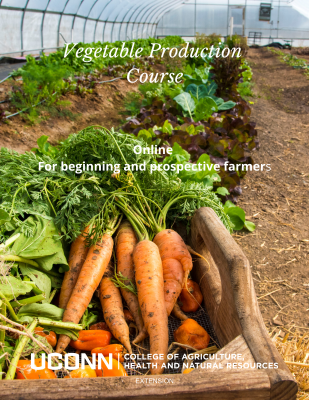

We’re offering a Vegetable Production Certificate Course, beginning on February 25th 2024. It is a fully online course for new and beginning farmers who have 0-3 years of vegetable growing experience or no formal training in agriculture. The participants will learn answers to the basic questions about farm business planning, planning and preparing for vegetable farm, warm and cool-season vegetable production techniques, season extension, identification of biotic and abiotic issues, and marketing. The price of the course is $149.
Please contact the course coordinator, Shuresh Ghimire (Shuresh.Ghimire@uconn.edu, 860-870-6933) with any questions about this course.
Registration deadline: February 19, 2024
Register at s.uconn.edu/vegcourse
Course Description
This vegetable production course is designed to benefit beginner vegetable producers who have 0-3 years of vegetable growing experience or no formal training in agriculture. The participants will learn answers to the basic questions about farm business planning, planning and preparing for vegetable farm, warm and cool-season vegetable production techniques, season extension, identification of biotic and abiotic issues, and marketing.
- The course consists of seven online modules, each of which include a self-paced video, supplemental material, and a short quiz.
- The slides presented in the video are also provided in a downloaded PDF file for note-taking and future reference.
- The supplemental materials are great addition to your personal reference library and valuable resources for all farmers.
- The module quizzes are designed to test your knowledge of the key points within the specific module.
- Each module is expected to take you approximately one hour to complete, although this varies by user.
Course Learning Objectives
At the end of this course, you will be able to:
- Develop a farm business plan, which will help you keep records, manage time more effectively, and price products.
- Explain the characteristics of a suitable site for commercial vegetable crop production and adjust as needed.
- Perform soil sampling protocols for nutrient analysis.
- Explain full season tasks involved in vegetable farming including planting, in-season care, harvesting, and post-harvest considerations for some warm-season and cool-season vegetables.
- Scout and identify biotic and abiotic issues.
- Explain tools for season extension.
- Understand different strategies, resources, options, and models for direct-to-consumer retail.
- Identify additional reliable and fact-based informational resources on topics related to vegetable farming.
Table of Contents
- Pretest: 25 questions
- Farm business planning: Developing a farm business plan and enterprise budgeting
- Plan and prepare for vegetable farm: Site selection, soil test, and cover crops
- Warm season vegetables: Crop selection, planting to harvesting and post-harvest management
- Cool-season vegetables: Crop selection, planting to harvesting and post-harvest management
- Identification of pests and abiotic problems: Identification of diseases, insects, nutritional and other issues
- Season extension: Differences among low, caterpillar, and high tunnel; Opportunities and challenges in high tunnel growing; Micro-environment management
- Marketing: Different strategies, resources, options, and models for direct-to-consumer retail.
- Post-test: 25 questions
Course Dates (2024)
While this is an asynchronous course which you may work through at your own pace between Feb 25 and Apr 7, a recommended class schedule is listed below:
Feb 25 – 29 – Complete the Online pre-test (pre-course quiz)
Mar 1 – 4 – Module 1 – Farm Business Planning
March 5 – 9 – Module 2 – Planning and preparing for a vegetable farm
Mar 10 – 14 – Module 3 – Warm Season Vegetables
Mar 15 – 19 – Module 4 – Cool Season Vegetables
Mar 20 – 24 – Module 5 – ID Pest and Abiotic Problems
Mar 25 – 29 – Module 6 – Season Extension
Mar 30 – Apr 3 – Module 7 – Marketing
Apr 4 – 7 – Complete the post-test
Course Instructors
Abby Beissinger, Former Assistant Extension Educator, UConn
Bruce Gresczyk Jr., Gresczyk Farms
Jiff Martin, Extension Educator, UConn
Joe Bonelli, Associate Extension Educator, UConn
Kip Kolesinskas, Consulting Conservation Scientist
Shuresh Ghimire, Assistant Extension Educator, UConn
Steve Munno, Massaro Community Farm
Please contact the course coordinator, Shuresh Ghimire (shuresh.ghimire@uconn.edu, 860-870-6933) with any questions about this course.

